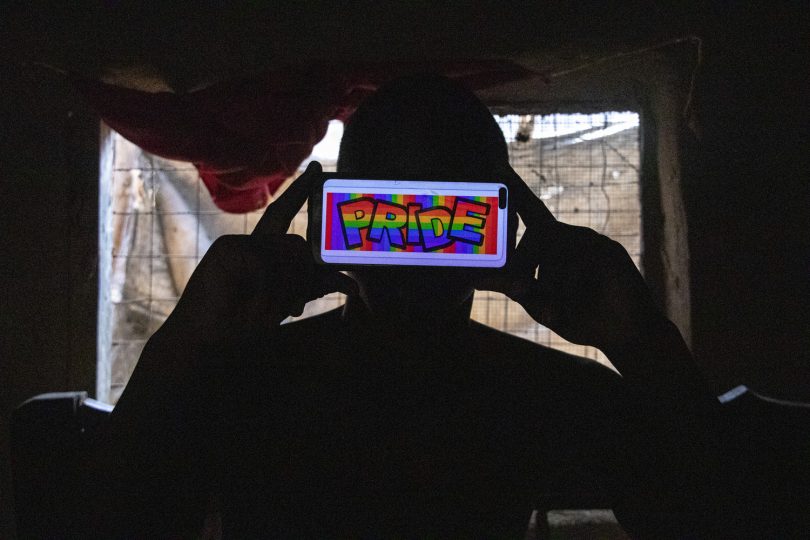Online attacks against Uganda’s LGBTQ communities have drastically increased, owing to overly broad laws that criminalize various aspects of the lives of LGBTQ people and entrench discrimination, Amnesty International said in a new report today.
The report, “Everybody Here Is Having Two Lives and Phones”: The Devastating Impact of Criminalization on Digital Spaces for LGBTQ People in Uganda, details widespread patterns of technology-facilitated gender-based violence (TfGBV) against LGBTQ people in Uganda. It documents cases of doxing, outing, threats of violence, blackmailing, impersonation, hacking and disinformation — further marginalizing LGBTQ people, especially those from disadvantaged socio-economic backgrounds.
The Anti-Homosexuality Act (AHA) 2023, in particular, was found to have fostered a climate of impunity for attacks against LGBTQ people, forcing both individuals and organizations to significantly alter how they present themselves and engage with people online.
“Our research shows that, while LGBTQ activists and organizations have continued to use digital spaces in a very hostile environment, the stigma, violence, and discrimination they face in offline spaces has been mirrored and amplified in digital spaces,” said Shreshtha Das, Amnesty International’s Gender Researcher/Advisor.
“TfGBV has devastating consequences for LGBTQ people, as online targeting can result in offline consequences, including arbitrary arrests, torture and other ill-treatment, forced evictions, dismissal from work, exposure to offline violence, as well as stress, anxiety and depression.”
TfGBV has devastating consequences for LGBTQ people, as online targeting can result in offline consequences, including arbitrary arrests, torture and other ill-treatment, forced evictions, dismissal from work, exposure to offline violence, as well as stress, anxiety and depression.”
Amnesty International conducted research across six Ugandan cities and neighbouring areas, including 64 interviews with LGBTQ individuals and organizations. The research reveals widespread TfGBV and highlights not only the failure of state authorities to prevent or address these abuses, but also their active role in encouraging and condoning them, exposing LGBTQ people to grave human rights abuses.
A ‘witch hunt’
LGBTQ individuals and organizations in Uganda rely on digital platforms to connect with their communities, share information about sexual health services, and protect their rights.
“Instead of adopting policies to combat TfGBV, the Ugandan authorities have clamped down on human rights defenders and organizations, placing discriminatory restrictions on their work.
The prevalence of TfGBV, however, has severely limited the possibilities for LGBTQ people to access, communicate and come together in digital spaces, while also hindering the outreach efforts of many organizations. Those providing health services to marginalized groups have been forced to avoid advertising their services online, fearing that the authorities could arbitrarily suspend their registration based on spurious accusations of “promoting homosexuality”.
“Instead of adopting policies to combat TfGBV, the Ugandan authorities have clamped down on human rights defenders and organizations, placing discriminatory restrictions on their work. Their acts amount to a witch-hunt against those perceived as “promoting homosexuality”, creating a chilling effect on the rights to freedom of expression and association,” said Marco Perolini, Amnesty International’s Civic Space Policy Advisor.
The report documents numerous instances where police seized devices or data of LGBTQ people by threatening them with arrest. Moreover, both police and private individuals have used social media platforms to connect with LGBTQ people first, and then target them with physical violence and blackmailing.
Blackmail was the most prevalent form of TfGBV noted across all locations. In addition, both police and private individuals have outed LGBTQ people, exposing them to online abuse, threats, physical violence, forced evictions and dismissal from work.
Amnesty International found that the widespread use of derogatory and offensive language against LGBTQ people is pervasive online, as well as disinformation campaigns that portray LGBTQ people in harmful ways, including depicting them as “sexual predators”.
These narratives reinforce the stereotyping of LGBTQ people and led to emotional distress, social ostracization, economic hardship and, in some cases, physical violence.
“Nowadays, digital spaces, which are so vital for LGBTQ people in Uganda, are often no safer than offline spaces — they are experiencing discrimination and violence in both,” said Roland Ebole, Amnesty International’s Uganda researcher.
Prejudicial laws worsening homophobia and transphobia
While TfGBV against LGBTQ individuals was common in Uganda before, its severity and prevalence have surged since the passage of the AHA 2023, which has intensified homophobic and transphobic public discourse.
All interviewees told Amnesty International that they would not report TfGBV to the police due to fears of being outed, blackmailed or arrested. In the few instances when LGBTQ people reported TfGBV cases, the police failed to take any action and instead subjected them to further humiliation.
“Nowadays, digital spaces, which are so vital for LGBTQ people in Uganda, are often no safer than offline spaces — they are experiencing discrimination and violence in both,”
LGBTQ individuals and organizations also said that reporting cases of TfGBV on social media platforms remained challenging. They often did not know how to report abuses. In spite of social media platforms’ policies to address TfGBV, concerns remain regarding content moderation, especially in widely spoken local languages other than English.
Out of all the entities Amnesty International wrote to, including various state authorities in Uganda, private organizations, and social media companies (Meta, TikTok and X) detailing our findings, only Meta and TikTok responded. Their responses have been reflected in the report.
“The Ugandan Parliament must immediately repeal the Anti-Homosexuality Act 2023 and other laws that criminalize acts and behaviours that disproportionately impact LGBTQ people,” said Shreshtha Das.
“The authorities must also establish an independent mechanism to conduct effective, prompt, impartial, and independent investigations into allegations of TfGBV and other human rights violations committed against LGBTQ people.”







